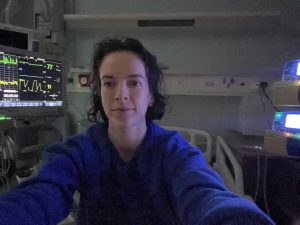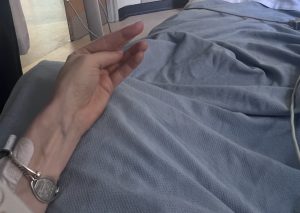

Amber
Amber is a doctor and lives with Gitelman syndrome, a condition that causes severe salt wasting. Her position as both a doctor and someone living with a rare condition gives her a unique insight into the rare world. This has been her journey so far.
What happened?
I was 8 years old, watching Casualty on tv (I was obsessed with medical stuff from a young age!). My hands and feet went into a severe cramp (medical term = Carpopedal spasm). Mum called the GP out, who said I had probably been breathing too fast and had given myself a cramp (I mean casualty is exciting, but not THAT exciting). I was made to breathe into a paper bag, and we were all very bemused.
1.5 years of tests
My diagnosis was made 1.5 years later via Great Ormond street (and a lot of tests! Urine/sweat/blood tests etc). At age 15 this diagnosis was changed again and at age 18, my DNA was finally taken and sent to France to confirm the diagnosis which was Gitelman Syndrome.
What is it?
Gitelman’s is rare – around 25 cases per 1 million people. It is inherited in an autosomal recessive way (both my parents carry the gene, but neither have the condition). My brother is also unaffected. It causes severe salt wasting from my kidneys which means I lose too much sodium, potassium and magnesium. These are vital electrolytes to keep the body working on a daily basis. Humans cannot survive without them.
A funny symptom of Gitelman’s
People living with Gitelman’s get salt cravings, this is the body’s natural way of trying to replace the salt that the kidney is losing. From a young age I would eat salt at restaurant tables, as soon as I found the salt shaker I would just pour it straight into my hand and then my mouth. I couldn’t stop! My friends now know when we are out for dinner, to pass me the salt immediately! Most people with Gitelman’s crave salty/sour foods, such as anchovies, lemons, pickles and salty snacks.
The downside
Unfortunately the syndrome can be crippling, it causes severe muscle weakness, fatigue, fainting, cramps, joint pain, thirst and cardiac arrhythmias. Over 6 in 10 of those living with the condition get heart palpitations.
At age 18 I got a severe vomiting bug (this can be very dangerous as the body loses even more vital salts). When I arrived at A&E we tried to explain to the receptionist the urgency, but I was left in a chair in the waiting room.
Sadly by the time I made it to resus, I had ascending paralysis (I couldn’t move my legs) and my oxygen levels were critically low (my breathing muscles were going into spasm). There were 10+ doctors and nurses around my bed sticking needles in me. My cramps were so severe that I bent the cannula in half in both arms and they simply fell out, blood all over the floor. We pleaded for the intravenous electrolyte medication but were told we had to wait for the blood results to come back.
I was eventually given the drugs I needed, but was traumatised by this experience (as were my parents who tried to advocate for me. My dad was told off for ‘disturbing’ the department.)
Giving magnesium and potassium through the vein can be dangerous in normal healthy individuals, hence the delay that day, but with people living with Gitelman’s, timing is crucial and some of us can (and have) died in our support group. This is the danger of rare conditions, as doctors we must always listen to the patient carefully, they are almost always experts in their condition.

Managing the condition
I currently take approx. 63 tablets a day for this syndrome, and a further 12 for other conditions I have. Sometimes, if I exercise / sweat / am unwell etc., I have to take extra to manage my condition.
Some days are easier than others. I can’t drink alcohol, do endurance sports or overheat. Simple things such as a day at the beach or a workout can leave me with awful cramps and feeling unwell for days.
Everywhere I go I have to take spare medication with me, electrolyte drinks and salty snacks. Standing up still simply isn’t an option. When I was doing my medical training, theatre support staff would feed me and pass me drinks through my mask, so I could finish my theatre cases without collapsing. I would nip to the cupboards to get support socks to boost my blood pressure on long ward rounds.
I see my renal specialist twice a year and am currently having blood tests every 3-4 weeks to monitor my electrolytes levels.
I attend hospital for electrolyte infusions when needed, which is usually whenever I get any illness such as a flu or infection. These ALWAYS cause the condition to temporarily worsen.
-
Amber's #StoriesBehindTheStats
-
25
cases per 1 million people
have Gitelman syndrome
-
63
tablets a day
for Gitelman syndrome
-
3
diagnosis changes
before Gitelman Syndrome confirmation
Advocating for rare conditions
As a doctor I have a unique insight into both sides of the bed. I have both been treated well and awfully on many occasions. Dismissed by my own colleagues, told to just ‘eat a banana’, I’ve heard it all.
I once had to take a day off work as my leg cramps were so bad, and one of my colleagues sent me a sarcastic text saying ‘Aww do your legs hurt?!’. At times I felt like a fraud, as my condition is so invisible to the outside world.
Rare Disease Day is so important to me. By educating ourselves and raising awareness, we save lives. Always listen to your patient.
We have a wonderful Facebook group with around 2,100 patients in it. So if you have Gitelman’s we would love to welcome you!
A bit about me
Hello I’m Amber, I’m a 38 year old Doctor. I like rescuing animals (I have 2 rescue cats (Beau and Raisin) and 2 rescue hens (Nugget and Maggie)). I love helping others and that’s why I am a doctor. I love dancing, afro music and gardening.
References:
- Parmar MS, Muppidi V, Bashir K. Gitelman Syndrome. [Updated 2023 May 16]. In: StatPearls [Internet]. Treasure Island (FL): StatPearls Publishing; 2024 Jan-. Available from: https://www.ncbi.nlm.nih.gov/books/NBK459304/
